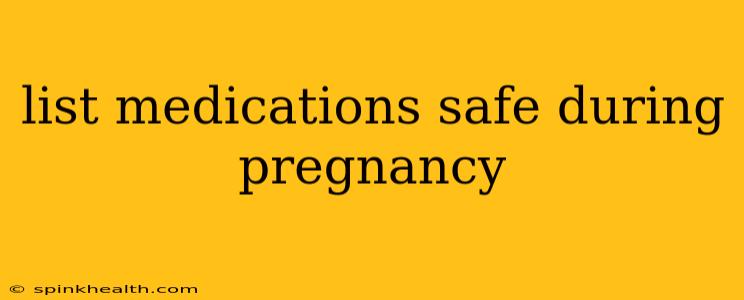Pregnancy is a transformative journey, a time of incredible change and anticipation. But for many expectant mothers, the question of medication safety looms large. The good news is that while many medications pose risks during pregnancy, several are considered safe when used under the guidance of a healthcare professional. This isn't a comprehensive list, and it's absolutely crucial to consult your doctor or obstetrician before taking ANY medication during pregnancy, even over-the-counter drugs. This article aims to provide information, not medical advice.
This journey began for Sarah, a first-time mom-to-be, with a persistent headache. The throbbing pain made it hard to focus on the exciting changes happening within her. She knew she needed relief, but the fear of harming her baby overshadowed everything. This is the reality many pregnant women face.
The following sections address common questions and concerns about medication use during pregnancy, helping expectant mothers navigate this delicate balance between symptom relief and fetal well-being.
What are some common medications considered safe during pregnancy?
Many factors determine medication safety during pregnancy, including the trimester, the specific medication, and the mother's overall health. However, certain medications are generally considered safer than others. These often fall into categories for managing specific symptoms:
- Prenatal Vitamins: Folic acid is crucial for preventing neural tube defects, and prenatal vitamins often include other essential nutrients like iron and calcium. Your doctor will recommend the appropriate dosage.
- Pain Relievers: Acetaminophen (Tylenol) is often recommended for mild to moderate pain and fever. However, always follow the recommended dosage. Nonsteroidal anti-inflammatory drugs (NSAIDs) like ibuprofen (Advil, Motrin) should generally be avoided, especially in the later stages of pregnancy.
- Antacids: Some antacids can be used to relieve heartburn and indigestion. However, it's essential to choose those without aluminum or magnesium in high doses, as these can have potential side effects. Consult your doctor for specific recommendations.
- Allergy Medications: Cetirizine (Zyrtec) and loratadine (Claritin) are generally considered safe, but always check with your doctor. Older antihistamines should be avoided due to potential drowsiness and other side effects.
- Insulin: For women with diabetes, insulin is a necessity to manage blood sugar levels. It's essential to work closely with an endocrinologist and your obstetrician to maintain optimal glucose control throughout the pregnancy.
What medications should be avoided during pregnancy?
Many medications carry significant risks during pregnancy, and it's crucial to avoid them unless absolutely necessary and under strict medical supervision. This includes:
- NSAIDs (ibuprofen, naproxen): These can interfere with blood flow to the baby and potentially cause premature closure of the ductus arteriosus (a blood vessel in the baby's heart).
- Most Antibiotics: While some antibiotics are safe, others can harm the developing fetus. Your doctor will prescribe the safest option if an antibiotic is needed.
- Accutane (isotretinoin): This medication for acne can cause severe birth defects.
- Warfarin (Coumadin): This anticoagulant can cause bleeding in both mother and baby.
- Many anti-seizure medications: Some medications to manage epilepsy have higher risks during pregnancy, requiring close monitoring by a specialist.
Are there specific considerations for different trimesters?
Medication safety considerations shift throughout the pregnancy. The first trimester is a period of intense fetal development, making it particularly critical to avoid unnecessary medications. The second and third trimesters also have specific risks associated with certain medications and their impact on fetal development and the birthing process. Always discuss medication use with your doctor, especially considering the trimester.
What are the risks of taking medication during pregnancy?
Taking medication during pregnancy carries potential risks, ranging from mild side effects to serious birth defects. The severity of these risks depends on many factors, including the type and dosage of medication, the stage of pregnancy, and the mother's health. Some medications can cross the placenta and affect fetal development, leading to complications. This is why it's vital to have open communication with your healthcare provider.
How can I find out if a medication is safe during pregnancy?
The best and safest resource is your doctor or obstetrician. They can assess your individual health, the specific medication, and the stage of your pregnancy to determine the safest course of action. Additionally, you can check the official prescribing information for the medication (though it can be complex for non-medical professionals).
Remember, Sarah's story highlights the importance of informed decision-making regarding medication during pregnancy. By consulting her doctor, she received appropriate pain relief without compromising the health of her baby. Always prioritize communication with your healthcare provider – your well-being and your baby’s health are paramount.

